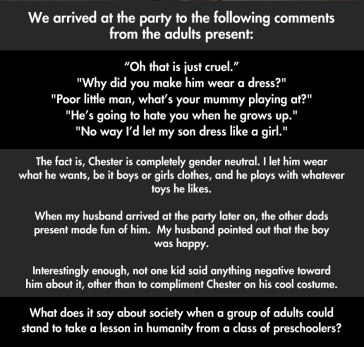Gender is a social construction. Men and women are socialized to be either masculine or feminine from the time of infancy. Boys are socialized to be strong, assertive, competitive, and rational. Social psychologists consider these to be instrumental traits. Girls are socialized to be soft, communal, nurturing, and emotional. These traits are termed expressive. In our culture, we often pass judgement on a person’s successful construction of gender. The more you take on these gender norms, the more man or woman you are considered to be. There is an argument in the psychological literature that it takes more work for males to become real men than it takes for females to become real women. This is referred to as the precarious nature of manhood.
In a study where people were asked what it would take for a woman to lose her “womanhood” answers where much more biologically driven, for example – “a hysterectomy.” Where as for a man to loose his “manhood” the answers were much more psychosocial, for example- “loose his job.” It seems those things we consider womanly have much more to do with her physical body. To be a real man seems much more attached to a man’s performance of social male norms, like being the bread winner or satisfying his female sexual partner.
Here is a photo that first appeared on TheMetaPicture.com that has been making its way around the web. When I read the account I thought it was a perfect example the precarious nature of manhood argument.
I see two ways that this post can illustrate precarious manhood. First is the reaction of the adults at the party. They make it clear that they believe Chester will suffer some detriment for not being socialized into the strict male gender norms they believe will produce a strong, assertive, competitive and rational man. If they thought that there was something innate about being a boy that would produce these traits, there would be no need for the worry. Clearly, their belief is that Chester needs to have expectations and directives that help him develop masculine and not feminine traits. That his parents have set gender neutral expectations and directives for him is scorned. That his parents consider his happiness above all else is of no consequence.
The teasing Chester’s father suffers may be a stronger example than the first. It seems all it took for this man to loose his card to the category “man” club was to have a “feminine” son. Precarious, indeed! Whether lighthearted joking or more serious bullying, it all has the same effect – it forces men to maintain a constant vigil, to be on the look out for anything that might provoke such ridicule.
But isn’t it the strength of character of Chester’s father, to put the happiness of his son above all else, that is the mark of a real man? Isn’t it sad that this episode may cause dad to rethink this position as Chester’s happiness and even his safety may one day be tied to the level of femininity vs masculinity he displays? Sadly, our culture has not made room for boys who are being raised with gender neutral expectations. It will take all of us to make that world a reality.

